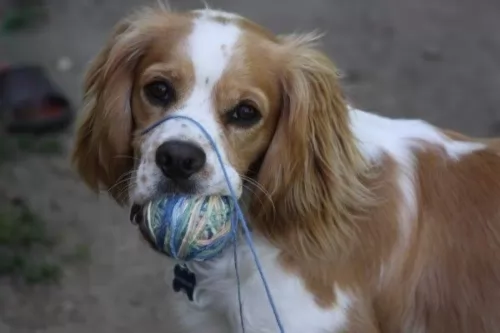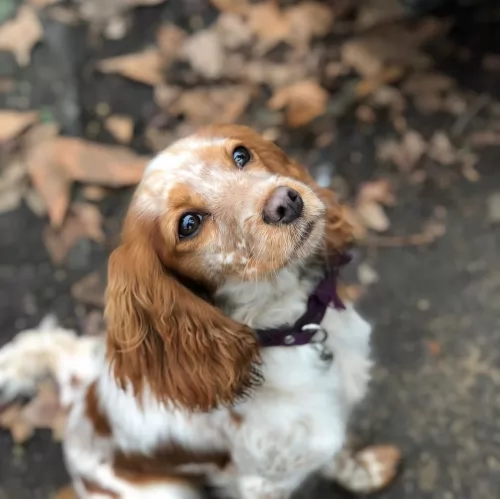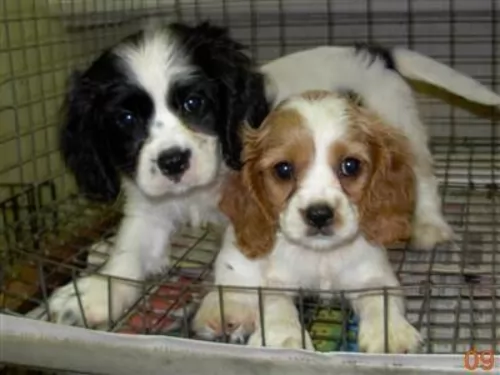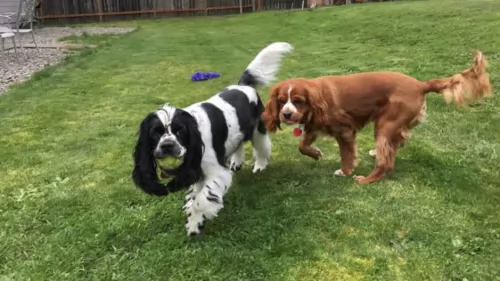 Petzlover
Petzlover Both Boston Terrier and Cockalier are originated from United States. Both Boston Terrier and Cockalier are having almost same height. Both Boston Terrier and Cockalier are having almost same weight. Both Boston Terrier and Cockalier has almost same life span. Both Boston Terrier and Cockalier has almost same litter size. Boston Terrier requires Low Maintenance. But Cockalier requires Moderate Maintenance
Both Boston Terrier and Cockalier are originated from United States. Both Boston Terrier and Cockalier are having almost same height. Both Boston Terrier and Cockalier are having almost same weight. Both Boston Terrier and Cockalier has almost same life span. Both Boston Terrier and Cockalier has almost same litter size. Boston Terrier requires Low Maintenance. But Cockalier requires Moderate Maintenance
 Nicknamed the American Gentleman, the Boston Terrier is the result of crossing the British Bulldog with the white English Terrier. At first the Boston Terrier was bred to be a fighting dog, but since then, undesirable characteristics have been bred out and today the Boston Terrier is regarded as an indoor dog that doesn’t tolerate extreme weather conditions.
Nicknamed the American Gentleman, the Boston Terrier is the result of crossing the British Bulldog with the white English Terrier. At first the Boston Terrier was bred to be a fighting dog, but since then, undesirable characteristics have been bred out and today the Boston Terrier is regarded as an indoor dog that doesn’t tolerate extreme weather conditions.
The breed emerged in the 1870s when Robert Hooper from Boston bought a dog thought to be a mix of a Terrier and Bull type lineage. A specialist breed club was formed in 1891 and in 1979 the commonwealth of Massachusetts named the Boston Terrier the Official State Dog. By the 20th century, the breed’s color and patterns were standard and an essential feature.
 Known also as the Cockalier Spaniel, the Cockalier is a sweet crossbreed – a mix between the Cocker Spaniel and the Cavalier King Charles spaniel.
Known also as the Cockalier Spaniel, the Cockalier is a sweet crossbreed – a mix between the Cocker Spaniel and the Cavalier King Charles spaniel.
Both of these spaniels do have some differences. The Cockalier is a designer breed that hails from the USA. Because he is a hybrid breed the Cockalier isn’t recognized by the American Kennel Club, but as a hybrid, it is recognized by the American Canine Hybrid Club (ACHC).
 The Boston Terrier is a lively, strong-willed breed with an alert expression and fairly large, erect ears. He is a small to medium sized dog and his square muzzle puts him among the Bull breeds.
The dog is compact in build and varies quite significantly in size. Weight with the dog is actually divided into 3 categories – lightweight (under 6.8kg), middleweight (up to 9kg) and the heavyweights being between 9.1kg and up to 11.4kg. The Boston has a short head and a naturally short, low-set tail. The coat is short and smooth, and the colour can be brindle with white markings, brown and white or black and white.
The Boston Terrier is a lively, strong-willed breed with an alert expression and fairly large, erect ears. He is a small to medium sized dog and his square muzzle puts him among the Bull breeds.
The dog is compact in build and varies quite significantly in size. Weight with the dog is actually divided into 3 categories – lightweight (under 6.8kg), middleweight (up to 9kg) and the heavyweights being between 9.1kg and up to 11.4kg. The Boston has a short head and a naturally short, low-set tail. The coat is short and smooth, and the colour can be brindle with white markings, brown and white or black and white.
It’s the energetic liveliness of the Boston Terrier that makes him such a lovable and popular pet. He has an affectionate, gentle nature that makes him a fantastic family pet and he gets on well with children and pets in the home. He can adapt to city or country life. One or two interesting facts of this breed are -
with his short nose, he is prone to drool and snore
he is prone to corneal ulcers because of his large, somewhat protruding eyes
with a small pelvis, the females often battle with the birthing process and may require a caesarean section.
 The Cockalier is a medium-sized dog standing at between 30 and 38cm in height and weighing roughly between 5 and 12kg.
The Cockalier is a medium-sized dog standing at between 30 and 38cm in height and weighing roughly between 5 and 12kg.
The coat of the Cockalier is silky and wavy. The coat is medium length and can be in colors such as golden, red, black or maybe white and brown.
The ears are fairly long and floppy, the eyes brown and expressive and the tail docked. If left, the tail is long and feathery.
The Cockalier is lively, gentle, intelligent and friendly with his human family, though he can be a little bit aloof with strangers.
He bonds very strongly with his family. They’re robust and are playful with children. They’re active dogs too and love nothing more than a hectic ball game. They don’t know when to stop and can become utterly exhausted if you don’t stop the game.
Have him trained and socialized and then he becomes even more amicable and he’s smart enough to learn basic commands without any trouble.
 The Boston Terrier is such a sweet little dog, but you can’t really say what your puppy’s personality will be as personality varies quite a bit between individual Boston’s. Remember that just like with a human child, your puppy will turn out with characteristics that can be attributed to the way he was raised. The Boston just loves his human family and he wants to be part of all your activities, even though he may gravitate towards one favorite family member.
The Boston Terrier is such a sweet little dog, but you can’t really say what your puppy’s personality will be as personality varies quite a bit between individual Boston’s. Remember that just like with a human child, your puppy will turn out with characteristics that can be attributed to the way he was raised. The Boston just loves his human family and he wants to be part of all your activities, even though he may gravitate towards one favorite family member.
Your Boston is a Terrier and that means he is full of life and will require being exercised by you. He can’t just be left outdoors day after day because this is one particular breed that can’t adapt to changing weather conditions. He likes being inside where the temperature is more even. Look after your Boston, because if you do, you’ll be rewarded by having one of the best friends you’ve ever had.
 The Cockalier is such a clever dog and he wants to please. He just loves his human owners, protecting them against strangers. He doesn’t take too kindly to strangers, preferring to devote all his love and loyalty to those he knows.
The Cockalier is such a clever dog and he wants to please. He just loves his human owners, protecting them against strangers. He doesn’t take too kindly to strangers, preferring to devote all his love and loyalty to those he knows.
He just craves attention and wants to be in your vicinity all the time. He is also good with children and will get on well with other pets in the home.
Once you’ve had a Cockalier in your life, you’ll want to reconsider having one of them again as they make awesome pets and companions.
 Boston Terriers are generally healthy, feisty little dogs but it is always wise to know that you may well come across some health conditions that can affect your pet.
Boston Terriers are generally healthy, feisty little dogs but it is always wise to know that you may well come across some health conditions that can affect your pet.
Your Boston may well have to contend with cataracts, and in the dog world, this isn’t only an ailment for old dogs. Juvenile cataracts can develop in young puppies already. Cherry Eye is another eye problem with a prolapse of the gland of the third eyelid. It is also an eye disease than can be found in young dog of less than a year old.
Boston Terriers actually have a fairly high incidence of deafness in one or both ears. White Bostons tend to produce more puppies with deafness.
The Boston Terrier is a brachycephalic dog and therefore more predisposed to Brachyphalic Syndrome where the dog battles to breathe because of too much soft tissue which forms in the airways.
To avoid many dog diseases with your Boston, buy your puppy from a reputable dog breeder who screens dogs used in a breeding program as this prevents puppies inheriting genetic disorders.
 The Cockalier is a healthy dog breed and can reach between 12 and 15 years of age. Look out for common canine health issues such as hearing loss and ear infection and vision issues.
The Cockalier is a healthy dog breed and can reach between 12 and 15 years of age. Look out for common canine health issues such as hearing loss and ear infection and vision issues.
Cockaliers that have an ear infection will shake their head and scratch their ears. The inside of the ears may be red and there may be an unpleasant smell coming from the ears. Your pet will need to see the vet.
This is a common disease with King Charles Spaniels where the mitral valve wears out and leaks and is associated with a heart murmur.
The earliest sign of a leaking mitral valve is normally a heart murmur, but it doesn’t mean heart failure is imminent, but congestive heart failure will eventuallt occur. Your dog will tire when walking, be lethargic and also have a cough. It will definitely be time to see the vet.
 The Boston Terrier is a lively dog, and even though he doesn't have any extreme exercise requirements, he will still require you exercising him by taking him on walks, or having ball games with him. As an essentially indoor dog, he can even enjoy some quieter indoor games.
The Boston Terrier is a lively dog, and even though he doesn't have any extreme exercise requirements, he will still require you exercising him by taking him on walks, or having ball games with him. As an essentially indoor dog, he can even enjoy some quieter indoor games.
You’ll be able to gauge how much your pet requires in terms of high quality food, but by the time he is an adult, he usually has one or two bowls of food a day. Size and age play an important role in determining his eating habits. Home made foods made up of rice, meat and vegetables are always welcome for your pet and these can be added into his top quality commercially produced dog food. For a healthy dog who is free of skin problems include some raw meat in the diet from time to time. Always make sure that there is a bowl of fresh, cool water which is available 24/7.
With his short coat, the Boston Terrier isn’t a heavy shedder and is low maintenance in terms of keeping his coat groomed. Brush him at least twice a week to remove loose hairs and to also prevent flea and tick infestations. Brush his teeth 2 or 3 times a week to ensure no plaque build-up which can damage the teeth. Never use human toothpaste, but invest in special toothpaste and -brush for dogs. If he is essentially an indoor dog, you may have to get the vet to trim his nails too.
 When you choose one of the commercially manufactured dog foods there are, you want to avoid those more inferior ones that have ingredients in them that can cause your dog to get sick.
When you choose one of the commercially manufactured dog foods there are, you want to avoid those more inferior ones that have ingredients in them that can cause your dog to get sick.
Look for the high-quality ones and choose the foods that have natural, wholesome ingredients in them. The vet can always help you with your decision to select a food that will of benefit to your pet.
Try to give your pet some good homemade food too such as some raw meat occasionally as well as boiled chicken, vegetables and brown rice. Fresh, cool water should be constantly available.
The Cockalier is going to require some brushing because he sheds quite a bit. Some dog owners prefer to get the Cockalier professionally trimmed. During grooming, check your pet over for any unusual lumps.
Your Cockalier will also need to have his nails trimmed, and because of the long ears, you will need to look inside the ears to ensure there is no redness and signs of infection.
Some dog owners don’t have the time or they don’t want to probe inside their pet’s ears and then a doggy-grooming-parlor can be a good idea as they do all this for you.
The Cockalier is an energetic dog, requiring a lot of exercise and games. These dogs love water games and will love you spraying him with water from the garden hose. Failing that, he’ll jump right into the swimming pool with you. Ball games are just up his street, and he will remind you every day that it’s time for his walk.